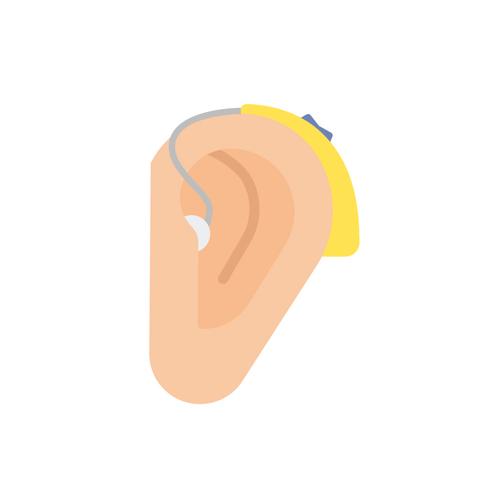What is a Hearing Aid?
A hearing aid is a small electronic device that you wear in or behind your ear which is programmed to your specific hearing loss needs. They will not make your hearing perfect, but they make sounds louder and clearer, reducing the impact hearing loss has on your life. The earlier you get them, the more you'll get out of them– so do not wait until your hearing gets really bad before seeking help. Hearing aids only help if you still have some hearing left, so do not put off getting help if your hearing is getting worse.
All hearing aids have five basic components: microphones, an amplifier, a loudspeaker, a battery and a computer chip.
- The hearing aid is powered by a battery.
- A microphone on the hearing aid pick up the sounds around you.
- These sounds are analysed by the computer chip, which processes sounds and sends them to the amplifier.
- The amplifier increases the volume and sends the sounds to the loudspeaker via tubing in an ear mould in the ear canal or through a thin wire to a speaker in the ear.
- The sound is then transmitted into the inner ear or cochlear where it is turned into into electrical impulses. Those impulses are sent to the brain, which processes them and makes meaning of the sound.
Hearing aids can:
- help you hear everyday sounds such as the doorbell and phone
- improve your ability to hear speech
- make you feel more confident when talking to people and make it easier for you to follow conversations in different environments
- help you to enjoy listening to music and the TV, at a volume that's comfortable for those around you
There are two ways to get your hearing tested for a hearing aid:
Via the NHS
Your GP can refer you to an NHS hearing aid provider if they think you might need a hearing aid.
The benefits of getting a hearing aid on the NHS include:
- hearing aids are provided free as a long-term loan
- batteries & repairs are free (although there may be a charge if you lose/ break your hearing aid & it needs to be replaced)
- The NHS generally provides BTE aids or, very occasionally, the RITE type. You may need to pay for private treatment if you want one of the other types.
Via a private provider
If you do not mind paying for treatment, you can choose to go to a private hearing aid provider directly.
The benefits of getting a hearing aid from a private provider include:
- ?It may mean you can pick from a wider range of hearing aids, including the smaller, less visible models.
- You may not have to wait as long for appointments.
- If you choose to pay for private treatment, shop around to see what types of hearing aid are available from different providers.
- Consider the cost of ongoing support and equipment such as batteries, repairs, replacement hearing aids and programming.
Types of hearing aids
A variety of hearing aids are available but not all hearing aids are suitable for everyone, your audiologist will tell you which hearing aids are suitable for you/your hearing loss and/or within your budget.
Behind the ear (BTE) hearing aids
Receiver in the ear (RITE)
In the ear (ITE) hearing aids
In the canal (ITC) hearing aids
Completely in the canal (CIC) and invisible in the canal (IIC) hearing aids
CROS and BiCROS hearing aids
Body worn hearing aids
The local NHS Audiology Departments within Nottingham are:
https://www.nuh.nhs.uk/audiology/
https://www.sfh-tr.nhs.uk/our-services/audiology-adults/
For Hearing Loss Support Get In Touch With Us
If you would like more information about hearing aids for hearing loss support, please don't hesitate to get in touch with us at Hear Together.





